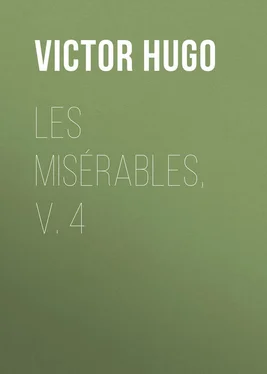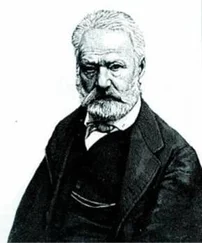Victor Hugo - Les Misérables, v. 4
Здесь есть возможность читать онлайн «Victor Hugo - Les Misérables, v. 4» — ознакомительный отрывок электронной книги совершенно бесплатно, а после прочтения отрывка купить полную версию. В некоторых случаях можно слушать аудио, скачать через торрент в формате fb2 и присутствует краткое содержание. Жанр: literature_19, foreign_antique, foreign_prose, на английском языке. Описание произведения, (предисловие) а так же отзывы посетителей доступны на портале библиотеки ЛибКат.
- Название:Les Misérables, v. 4
- Автор:
- Жанр:
- Год:неизвестен
- ISBN:нет данных
- Рейтинг книги:4 / 5. Голосов: 1
-
Избранное:Добавить в избранное
- Отзывы:
-
Ваша оценка:
- 80
- 1
- 2
- 3
- 4
- 5
Les Misérables, v. 4: краткое содержание, описание и аннотация
Предлагаем к чтению аннотацию, описание, краткое содержание или предисловие (зависит от того, что написал сам автор книги «Les Misérables, v. 4»). Если вы не нашли необходимую информацию о книге — напишите в комментариях, мы постараемся отыскать её.
Les Misérables, v. 4 — читать онлайн ознакомительный отрывок
Ниже представлен текст книги, разбитый по страницам. Система сохранения места последней прочитанной страницы, позволяет с удобством читать онлайн бесплатно книгу «Les Misérables, v. 4», без необходимости каждый раз заново искать на чём Вы остановились. Поставьте закладку, и сможете в любой момент перейти на страницу, на которой закончили чтение.
Интервал:
Закладка:
The revolution of July at once found friends and enemies in the whole world; the former rushed toward it enthusiastically and joyfully, while the latter turned away, each according to its nature. The princes of Europe, the owls of this dawn, at the first moment closed their eyes, which were hurt and stupefied, and only opened them again to menace, – it is a terror easy to understand and a pardonable anger. This strange revolution had scarcely required a blow, and had not even done conquered royalty the honor of treating it as an enemy and shedding its blood. In the sight of despotic governments which also have an interest in liberty calumniating itself, the revolution of July had the fault of being formidable and remaining gentle, but no attempt was made or prepared against it. The most dissatisfied and irritated persons saluted it; for whatever their selfishness or rancor may be, men feel a mysterious respect issue from events in which they feel the co-operation of some one who labors higher than man. The revolution of July is the triumph of right overthrowing fact, and is a thing full of splendor. Hence came the brilliancy of the revolution of 1830, and at the same time their mildness, for right that triumphs has no need to be violent. Right is justice and truth, and it is the property of right to remain eternally beautiful and pure. Fact, even the most necessary in appearance and best accepted by contemporaries, if it only exist as fact, and contain too little right, is no right at all, and is infallibly destined to become, with the duration of time, misshapen, foul, and perhaps even monstrous. If we wish to discover at one glance what a degree of ugliness fact can attain, when looked at through the distance of centuries, let us regard Machiavelli. He is not an evil genius, a demon, or a cowardly and servile writer: he is nothing but the fact, and not merely the Italian fact, but the European fact, the fact of the sixteenth century. He appears hideous, and is so in the presence of the moral idea of the 19th century. This struggle between right and fact has endured since the origin of societies. It is the task of wise men to terminate the duel, amalgamate the pure idea with human reality, and to make right penetrate fact and fact right pacifically.
CHAPTER II
BADLY STITCHED
But the task of wise men differs greatly from that of clever men, and the revolution of 1830 quickly stopped; for when a revolution has run ashore, the clever men plunder the wreck. Clever men in our century have decreed themselves the title of statesmen, so that the phrase has eventually become a bit of slang. For it must not be forgotten that where there is only cleverness, littleness necessarily exists, and to say "the clever" is much like saying the "mediocrities." In the same way the word "statesman" is often equivalent to saying "traitor." If we believe clever men, then revolutions like that of July are severed arteries, and a rapid ligature is required. Right, if too loudly proclaimed, begins to give way, and hence so soon as right is substantiated the State must be strengthened, and when liberty is injured attention must be turned to power. Here wise men, though they have not yet separated from clever men, begin to distrust them. Power, very good! But, in the first place, what is power; and secondly, whence does it come? The clever men do not appear to hear the muttered objection and continue their manœuvres. According to politicians who ingeniously place a mask of necessity upon profitable fiction, the first want of a people after a revolution, if that people form part of a monarchical continent, is to obtain a dynasty. In this way they say peace is secured after the revolution, that is to say, the necessary time for repairing the house and dressing the wounds. A dynasty hides the scaffolding and covers the hospital. Now, it is not always easy to obtain a dynasty, although the first man of genius or the first adventurer met with is sufficient to make a king. You have in the first case Bonaparte, and in the second Iturbide. But the first family come across is not sufficient to form a dynasty, for there is necessarily a certain amount of antiquity required as a race, and the wrinkle of centuries cannot be improvised.
If we place ourselves at the standpoint of statesmen, with all due reserves of course, what are the qualities of a king who issues from a revolution? He may be, and it is useful that he should be, revolutionary; that is to say, have played a personal part in the revolution, have become either compromised or renowned in it, and have wielded the axe or drawn the sword. What are the qualities of a dynasty? It must be national; that is to say, distantly revolutionary, not through acts done, but through ideas accepted. It must be composed of the past and be historical, and of the future and be sympathetic. All this explains why the first revolutions are satisfied with finding a man, Napoleon or Cromwell, while the second are determined on finding a family, like the House of Brunswick or the House of Orléans. Royal houses resemble those Indian fig-trees, each branch of which bends down, becomes rooted in the ground, and grows into a fig-tree. Each branch of the family may become a dynasty, on the sole condition that it bends down to the people. Such is the theory of clever men.
This, then, is the great art, – to give success the sound of a catastrophe, so that those who profit by it may also tremble at it; to season every step taken with fear; to increase the curve of the transition until progress is checked; to spoil this daybreak, denounce and retrench the roughness of enthusiasm; to cut angles and nails; to pad the triumph, muffle the right, roll the giant people in flannel, and put it to bed at full speed; to place this excess of health under medical treatment, and regard Hercules as a convalescent; to dilute the event in expediency, and offer to minds thirsting for the ideal this weak nectar; to take precautions against extreme success, and provide the revolution with a sunshade. 1830 practised this theory, which had already been applied to England by 1688. 1830 is a revolution arrested half-way, and a moiety of progress is almost right. Now, logic ignores this as absolutely as the sun ignores a rush-light. Who check revolutions half-way? The bourgeoisie. Why? Because the bourgeoisie represent satisfied self-interest. Yesterday appetite was felt, to-day fulness, and to-morrow satiety. The phenomenon of 1814, after Napoleon, was reproduced in 1830 after Charles X. Attempts have been made, though wrongly, to convert the bourgeoisie into a class, but they are merely the contented portion of the population. The bourgeois is a man who has at last time to sit down, and a chair is not a caste. But through a desire to sit down too soon, the progress of the human race may be arrested, and this has frequently been the fault of the bourgeoisie; and people are not a class because they commit a fault, and selfishness is not one of the divisions of the social order. However, as we must be just even towards selfishness, the condition for which that portion of the nation called the bourgeoisie yearned after the shock of 1830 was not inertness, which is complicated with indifference and sloth, and contains a little shame; nor was it sleep, which presupposes a momentary oblivion accessible to dreams, but it was a halt. This word contains a double, singular, and almost contradictory meaning, for it implies troops on the march, that is to say, movement, and a stop-page, that is to say, rest. A halt is the restoration of strength, it is repose armed and awake, it is the accomplished fact, posting its sentries and standing on guard. A halt presupposes a combat yesterday and a combat to-morrow, – it is the interlude between 1830 and 1848.
Читать дальшеИнтервал:
Закладка:
Похожие книги на «Les Misérables, v. 4»
Представляем Вашему вниманию похожие книги на «Les Misérables, v. 4» списком для выбора. Мы отобрали схожую по названию и смыслу литературу в надежде предоставить читателям больше вариантов отыскать новые, интересные, ещё непрочитанные произведения.
Обсуждение, отзывы о книге «Les Misérables, v. 4» и просто собственные мнения читателей. Оставьте ваши комментарии, напишите, что Вы думаете о произведении, его смысле или главных героях. Укажите что конкретно понравилось, а что нет, и почему Вы так считаете.












